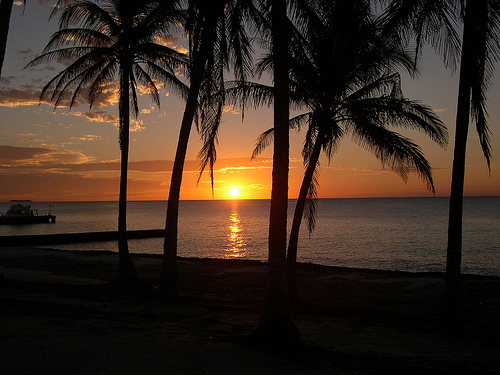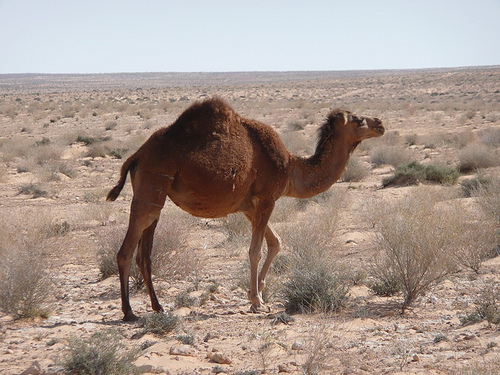Can be loved the desert after living in the Caribbean? …the desert is the face of each Saharaoui and if you don't love your face, to whom you will be able to love someday? -From the film Caribbean Sahara

What is the first impression of a Bedouin in a Caribbean Island? On his visit, blogger Ali Salem Iselmu shared the experience on a lovely story called "A Bedouin in the Caribbean ":
Era de noche y se veía en medio de la oscuridad aquel precioso poblado de casas de madera de color blanco y rojo. El ambiente a fiesta y carnaval era total, la música a todo volumen y la gente bailando salsa y sudando, nosotros lo único que hicimos a pesar del cansancio que teníamos era incorporarnos a la fiesta.
Cuando llegamos a la plaza de Banes después de bajar del autobús comprobamos con nuestros ojos aquella famosa frase que dice "con una lata y un palo bailan los cubanos" porque la naturaleza del Caribe y su alma son bien distintas a aquella sobriedad que a un nómada beduino, reconvertido en caribeño a través de los ritmos que marca la humedad de la noche.
When we arrive to the Plaza de Banes, after getting off the bus, we could see with our own eyes the famous phrase that says "with just a metal can and a stick Cubans can dance" because Caribbean nature and their souls are very different from the sobriety that fills a Bedouin nomad, who has become a Caribbean thanks to the rhythms of the night, felt with a hint of the humidity.
Cuban – Western Sahara cooperation is an early example of international aid. For example, back in the late seventies, 99 girls were chosen to study and improve their life conditions through education in Cuba, as Hernan Zin tells in "Saharaui Women" . One of the girls was Maima Mahamud from Dajla:
Permaneció en la isla caribeña el resto de su infancia y toda la adolescencia, estudiando, preparándose para el futuro, con la idea insoslayable, a pesar de su corta de edad, de que volvería al Sáhara para luchar por la independencia de su pueblo.
And she returned home as an educated woman, and created the Dajla School for Women to improve education and possibilities for girls in her homeland. This is a admirable action promoted by educated women, as according to the latest UNESCO report, it utilizes the resources of the country with the best educational standards in Latin America to counteract a country with a 50% literacy rate.
The bilateral cooperation is still active in spite of precarious situation in the island, as blogger El Porvenir del Sahara shows, with pictures of saharauis sipping tea in Cuba and Cubans dancing in Western Sahara. Ebnu, another blogger that shared his experience arriving together with other children from Argel to Cuba, brings us back to those days on 1978 when he arrived as a child to the Caribbean:
Aquellos primeros días los recuerdo con esa sensación triste y amarga. De estar perplejo ante una experiencia que apenas comenzaba y la curiosidad por descubrir un mundo nuevo lleno de ilusiones y sorpresas.
El mango, la guayaba, el mamey ¡Qué delicia!, la "Pelota", el Baseball, "¿cómo es posible que jueguen una cosa así, es que no conocen el fútbol o qué?" El contraste entre lo dulce y lo salado. Lo dulce y era muy dulce y lo salado muy salado. ¿Cómo comer arroz todos los días, día y noche? Si a mí no me gusta el arroz.
I recall those first days with a sad, bitter sensation. With the perplexity and the curiosity of a new experience that was just starting, a different world full of expectations and surprises.
Mango , guayaba , mamey .. Delicious!, the "ball", the baseball How can they play such game? Do they ever know football?. The contrast with sweet and salted. The sweets were too sweet, the salty food was too salty. How can someone eat rice every day, day and night? When I do not like rice…

If you like to see a movie about it, bloggers recommend Caribbean of the Sahara . The next time you meet a Bedouin dancing with rhythm or a Cuban offering you three cups of tea then you will know the reason.







7 comments
Another really well done post, Renata!
As a Cubarawi I just can say thanks for the good piece. It is also to be said that Cuba opened for us a window when all the doors were close.
Thanks again, Renata and please keep on the good job..
Interesante historia. Debería hacerse una experiencia similar entre Xela y Zacapa. En vez de beduinos sirviendo té habría paches con loroco o algo así. En fin. Ojalá fuera fácil aprender de otros.
Wonderful post, Renata!! I loved it!
I wish more ‘Badweens’ :) could visit Central Europe as well. And my country Ukraine in particular.
In early 1990s, in my days at university, we used to have 1/3 of class of international students, many of whom were from Tunis, Syria, Jordan, Egypt, and Morocco.
Our nations need more public diplomacy like you skillfully discribe in this post.
Nice post!
Really interesting even if most of the Cubarawis belong to the separastist faction Polisario Front. They remain sahraoui as I do but we don’t have the same views on the political situation on the Western Sahara region.
Thanks again to relate the life of sahraouis in Cuba.
Ahmed Salem